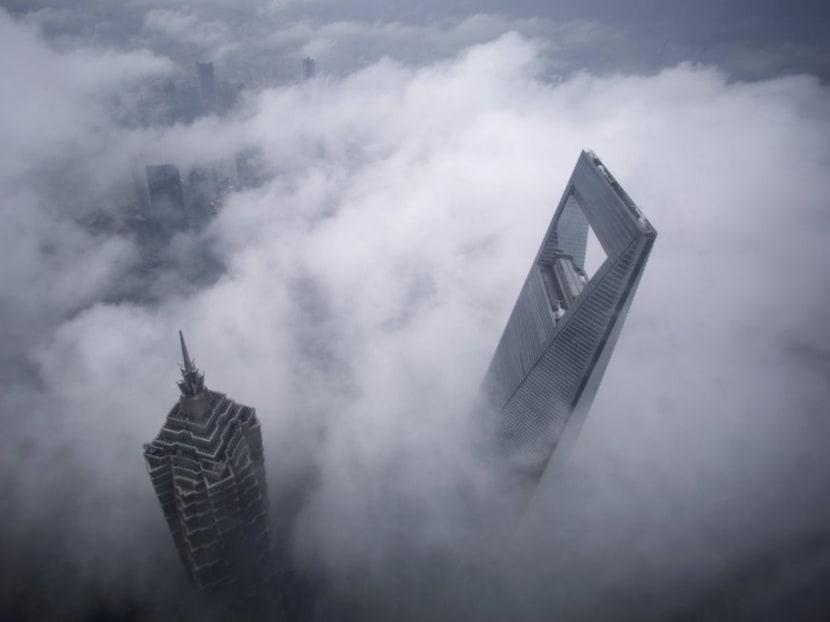China ‘not challenging status quo — it benefits from it’
SINGAPORE — China is not seeking to challenge the existing global world order because it benefits from the status quo, said panellists of a forum yesterday on China’s role in the international system.

Skyscrapers Shanghai World Financial Center (R) and Jin Mao Tower are seen during heavy rain at the financial district of Pudong in Shanghai in this May 15, 2015 file photo. Photo: Reuters
SINGAPORE — China is not seeking to challenge the existing global world order because it benefits from the status quo, said panellists of a forum yesterday on China’s role in the international system.
While some see Beijing as trying to establish a new non-Western world order with its recent initiatives such as the Asian Infrastructure Investment Bank (AIIB) and the One Belt, One Road project, the region would benefit more from partnering with China to plug infrastructural gaps, the speakers at the FutureChina Global Forum added.
“China has benefited from the international system … (and) has no interest to challenge the existing international system,” said Mr Li Cheng, director of John L Thornton China Center at the Brookings Institution, citing the example of China chairing the Group of Twenty (G20) starting this October, and Beijing’s interest in working with the International Monetary Fund (IMF).
Another panellist, Singapore’s Ambassador-At-Large Professor Tommy Koh, noted that President Xi Jinping had told President Barack Obama during a meeting in the United States in June 2013 that China is not seeking to challenge US’ global leadership, nor is Beijing “trying to evict the US from the Asia-Pacific”.
“What does China want? China wants to be respected by the world as a major power,” said Prof Koh. “China wants a seat at the top table. China wants its influence, its decision-making power in important international organisations such as the IMF, to more accurately reflect China’s rising influence and its capacity to contribute to international governance.” But this does not mean that China will challenge the US recklessly, as America remains the predominant superpower, the 100-odd businessmen and public servants in the audience heard.
Mr Yaseen Anwar, a Pakistani-American banker and senior adviser to the Industrial and Commercial Bank of China, said: “I don’t look at China as a challenger to the US; I’d say more as a partner, that’s how it should be.” He also noted that there were many economic benefits to be reaped if the two global powers could work together.
He noted that the South-east Asian region, specifically, the Association of South-east Asian Nations (ASEAN) is forecast to be the world’s fourth-largest economic bloc in the next 25 years, but urbanisation in the region stands at only 45 per cent, lower than the international norm of 55 to 65 per cent.
“In the next 25 years, the ASEAN region will become 60 per cent urbanised. Now, (how) in the world are they going to do this? Very simple, you need the infrastructure development,” Mr Anwar said. “And that’s where the One Belt, One Road comes in from China, and the AIIB.”
Fifty-seven countries have signed up as founding members of AIIB, with China being the biggest shareholder with a contribution of US$29.8 billion (S$40.7 billion). This came after Beijing’s announcement last November of a US$40 billion commitment to set up a Silk Road infrastructure fund to pursue its One Belt, One Road strategy, aimed at rejuvenating two ancient trade routes and knitting Eurasia into a single vast market.
Organised by Business China, the 90-minute panel discussion yesterday was titled China As A Challenger And As Part Of The Existing World Order: What Does This Mean For Meeting Global Challenges?
Professor Shen Ding Li, associate dean at Fudan University’s Institute of International Studies, agreed that China was a status-quo power, but took a different view that if China is perceived as a revisionist power, it is only in response to Japan’s actions in challenging the status quo, in an apparent reference to Japan’s Lower House of Parliament having just passed controversial security Bills to expand the role of its military. “It is not that China is challenging (the status quo). Japan changed it. We changed after Japan changed. Our fundamental purpose is prosperity, security and value. No change (to that),” Prof Shen said.





